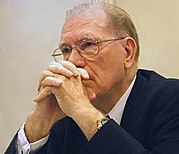Stanislav Menshikov
Stanislav Mikhaĭlovich Menʹshikov (Russian: Станисла́в Миха́йлович Ме́ньшиков; 12 May 1927, in Moscow – 13 November 2014, in Amsterdam), was a Russian economist and former Soviet diplomat.[1] He is the author of numerous publications in Russian and English including The Anatomy of Russian Capitalism, and a chapter in Capitalism, Communism and Coexistence. He was a professor at the Central Economic Mathematical Institute at the Russian Academy of Sciences in Moscow.[2] Menshikov was married to fellow economist Larissa Klimenko-Menshikova.
Soviet career
[edit]He was formerly employed at the Institute of World Economy and International Relations of the Soviet Academy of Sciences during the attempted economic reforms of Nikita Khrushchev.[3] In the late 1970s, Menshikov spent six years on the Secretariat of the United Nations in New York, during which time he was often asked to comment upon the U.S. economy by The New York Times.[4] During the 1980s, he served as a spokesman for the Soviet government on U.S. television.[5][6][7]
Post-Soviet career
[edit]Menshikov has published and commented on questions of economic transition. He co-authored Capitalism, Communism and Coexistence with John Kenneth Galbraith[8][9] and wrote The Anatomy of Russian Capitalism. He has been active with the LaRouche Movement's Schiller Institute and has spoken at their conferences,[10] along with Russian politician and author Sergey Glazyev. The English translation of Menshikov's book, The Anatomy of Russian Capitalism, was published by LaRouche's Executive Intelligence Review.[11] In addition, he took part in panel discussion along with the Dalai Lama, David Bohm and Robert Rauschenberg on the topic of "From Fragmentation to Wholeness" in a video released by the Yale Forum on Religion and Ecology.[12] Menshikov also authored a Russian-language book on the subject of a "compassionate economy" in response to request from the Dalai Lama.[13]
References
[edit]- ^ Douglas, Rachel (12 December 2014). "In Memoriam: Stanislav Mikhailovich Menshikov". Executive Intelligence Review. 41 (49): 30–36. ISSN 0273-6314. Retrieved 22 June 2015.
- ^ Laperche, Blandine; Uzunidis, Dimitri, eds. (2005). John Kenneth Galbraith and the Future of Economics. doi:10.1057/9780230523708. ISBN 978-1-349-54517-9.
- ^ Menshikov, Catastrophe or Catharsis? The Soviet Economy Today, p 8.
- ^ "Catastrophe or Catharsis? The Soviet Economy Today" Monthly Review, Jan, 1993 book review by Lynn Turgeon
- ^ The Philadelphia Inquirer, March 18, 1985, "SHULTZ SAYS REAGAN THINKS TIME IS RIGHT FOR A SUMMIT"
- ^ St Petersburg Times, February 15, 1982, "Haig: Chemical Weapons Used By Moscow"
- ^ The Philadelphia Inquirer, December 30, 1983, SOVIET PARLIAMENT FINISHES UP, PRAISES ANDROPOV"
- ^ Bio: John Kenneth Galbraith Archived 2007-02-05 at the Wayback Machine
- ^ Toronto Star, 4 May 2006, John Kenneth Galbraith, 97: Economist, visionary
- ^ Schiller Institute Conference program, May 2001
- ^ Press Release: Anatomy of Russian Capitalism
- ^ "FORE: Educational Tools-Class Resources-Video List3". Archived from the original on 2010-06-15. Retrieved 2009-06-01.
- ^ "Tibet House New Delhi Padmapani Lecture and Seminar on Compassionate Economy".
External links
[edit]- "Russian Capitalism Today," Stanislav Menshikov, Monthly Review, July–August 1999
- "Revolution from Above: The Demise of the Soviet System," Stanislav Menshikov, Monthly Review, October 1997
- "Poverty is Not Eliminated in One Year," Stanislav Menshikov, Moscow Tribune, February 28, 2000
